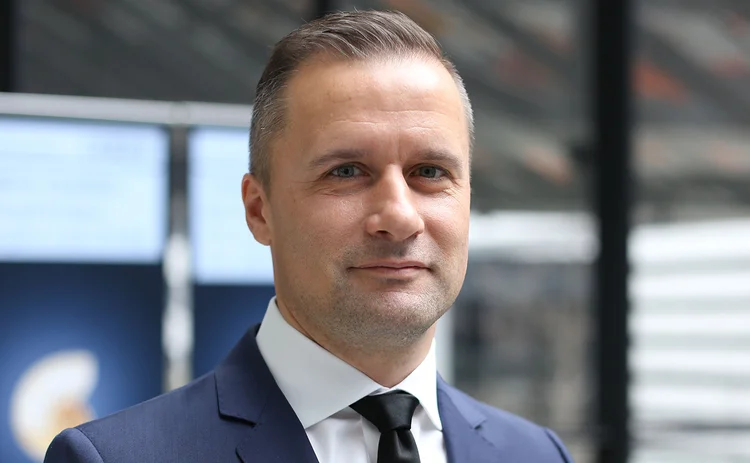
Rates flow market-maker of the year: LBBW
Risk Awards 2019: Landesbank uses e-trading – and Brexit – to boost its euro swap volumes, and its voice

Stuttgart is not generally seen as one of the swaps market’s centres of power, but this leafy city – more often associated with carmakers Mercedes-Benz and Porsche – is also home to Landesbank Baden-Württemberg (LBBW), which has quietly become one of the euro swaps market’s biggest dealers.
The bank sees strong flow capabilities as vital to the future of its corporate business, and has boosted its standing via two of the market’s structural changes: the growth of electronic swaps trading, and – in a roundabout way – Brexit.
The former has been a great leveller, allowing non-banks and regional lenders to challenge the big global dealers on their own turf. Germany’s largest landesbank has done just that.
Over the past couple of years, LBBW has been the top liquidity provider for euro swaps on Bloomberg’s multi-dealer swaps platform in four quarters, and among the top three in two others. In the past year, its client numbers have grown from 80 to 120.
“We realised that if you want to compete in a transparent, electronic market, then you are either a top-three liquidity provider or you have no role at all,” says Thilo Rossberg, head of fixed-income, currency and commodities trading at LBBW.
Clients that request quotes from LBBW say the bank wins the trade as much as 45% of the time, and praise the consistency of the bank’s pricing.
Brexit rears its head in the form of the partnership programme at Eurex; the German central counterparty (CCP) is hoping to attract customers from London’s LCH, and one lure is an economic incentive for dealers that quote tighter prices.
LBBW says it was one of the first market-makers to show the same bid/offer spread for euro swaps cleared at Eurex as those quoted at LCH’s SwapClear; as a result LBBW was the top bank in the partnership programme when the rankings were first produced in March. The five biggest dealers in the programme also get a seat on the CCP’s supervisory committee.
“We were the first to really see the implications of Brexit and what that could mean in terms of CCPs,” says Rossberg. “We saw the Eurex programme as a great opportunity to shape future market development, rather than just sitting on the sidelines.”

On Bloomberg, the bank attributes its growth in client numbers to its principle of sticking to ‘magenta’ pricing on the trading venue, which signifies a firm price to a counterparty – a rarer commodity in euro swaps trading than in US dollar swaps – as well as its continued use of a human trader to check and adjust the prices generated by its algorithm.
“Full algorithmic trading works well in US dollar swaps but less so in euro swaps,” says Pascal Souchon, head of euro linear trading at LBBW. “Euro swaps are not yet ripe for full automation but the market is getting there.”
In preparation for the shift to automation, the bank is developing full end-to-end auto-quoting and auto-hedging capability. For now, though, the human element means LBBW’s average quote time is below five seconds, whereas it is common for market-makers to respond in less than a second in the US dollar swap market.
But the euro market is getting faster. This has forced LBBW to be less aggressive recently in its euro swaps pricing as it reviews its technological infrastructure, causing a slight slump in its ranking on Bloomberg in the middle of the year. The bank had regained a spot in the top three in the fourth quarter, through mid-November.
The increasingly electronic nature of the euro swaps market has not stopped LBBW from conducting face-to-face meetings with its counterparties and being “proactive” to resolve any issues, clients say.
Kai Altobelli, global head of electronic sales for interest rate swaps at LBBW, says there is still a need for human contact.
“We see the electronic business as a relationship business, and we still go out and meet people. I’ve travelled a lot this year across Europe and I bring a euro trader with me to exchange views with clients,” he says.
So far, many of those clients have been other banks. In future, particularly when the category three clearing obligation arrives in June next year, the target client base will shift to buy-side participants that are more prevalent on Tradeweb.

“Asset managers have slightly different needs,” says Souchon. “A bank can hedge one swap with another, and they run a book. Portfolio managers have to justify the swaps in their portfolios, so they often go for IMM swaps in order to get perfect netting. It’s a different ball game.”
Altobelli recognises going after a new client base will be a challenge: “Asset managers are different. They want a long-term relationship with a bank that offers prices in lots of different markets – not just in swaps – so it might be harder to step in.”
The bank’s ambitions do not end there. It already quotes US dollar swaps for clearing at Eurex, and is now in the process of obtaining legal permissions to quote on US-regulated swaps venues, known as swap execution facilities. This involves registering as a swap dealer with the Commodity Futures Trading Commission, which brings with it a host of additional Dodd-Frank Act requirements.
“If you want to be a serious player in US dollar swaps, then it’s something you have to do,” says Rossberg.
Only users who have a paid subscription or are part of a corporate subscription are able to print or copy content.
To access these options, along with all other subscription benefits, please contact info@risk.net or view our subscription options here: http://subscriptions.risk.net/subscribe
You are currently unable to print this content. Please contact info@risk.net to find out more.
You are currently unable to copy this content. Please contact info@risk.net to find out more.
Copyright Infopro Digital Limited. All rights reserved.
As outlined in our terms and conditions, https://www.infopro-digital.com/terms-and-conditions/subscriptions/ (point 2.4), printing is limited to a single copy.
If you would like to purchase additional rights please email info@risk.net
Copyright Infopro Digital Limited. All rights reserved.
You may share this content using our article tools. As outlined in our terms and conditions, https://www.infopro-digital.com/terms-and-conditions/subscriptions/ (clause 2.4), an Authorised User may only make one copy of the materials for their own personal use. You must also comply with the restrictions in clause 2.5.
If you would like to purchase additional rights please email info@risk.net
More on Awards
Market data provider of the year: S&P Global Market Intelligence
S&P Global Market Intelligence has consistently met demands across Apac’s fast‑evolving capital markets, securing its win at the Risk Asia Awards 2025
Best user interface innovation: J.P. Morgan
J.P. Morgan wins Best user interface innovation thanks to its Beta One portfolio solution
Market liquidity risk product of the year: Bloomberg
Bringing clarity and defensibility to liquidity risk in a fragmented fixed income market
FRTB (SA) product of the year: Bloomberg
A globally consistent and reliable regulatory standardised approach for FRTB
Best use of cloud: ActiveViam
Redefining high-performance risk analytics in the cloud
Best use of machine learning/AI: ActiveViam
Bringing machine intelligence to real-time risk analytics
Collateral management and optimisation product of the year: CloudMargin
Delivering the modern blueprint for enterprise collateral resilience
Flow market-maker of the year: Citadel Securities
Risk Awards 2026: No financing; no long-dated swaps? “No distractions,” says Esposito







